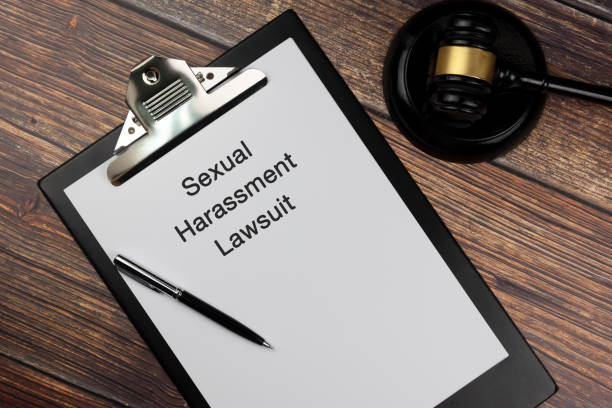
Sexual harassment by being slapped is disgraceful behaviour.
Victim of sexual harassment does not immediately complain
In the case of Taylor v August and Pemberton Pty Ltd [2023] FCA 1313, Ms Fiona Taylor claimed that she was sexually harassed by her employer, Mr Simon Grew. He was the sole Director of the store August and Pemberton Pty Ltd t/as Grew & Co. This case touched on a number of issues and topics. Primarily, that if a victim of sexual harassment does not immediately complain or produce hard proof then it did not happen.
Additionally, the case deals with victimisation, power dynamics between employee and employer, and how to complain of sexual harassment when the perpetrator is your direct boss. The case is a landmark decision as it relies upon the updated legislation of the Sex Discrimination Act 1984 (Cth) (SDA).
Being enforced as of December 2023, employers must positively act in order to eliminate acts of sexual discrimination/harassment, eradicate hostile or toxic workplace practices, and victimisation. Placing greater emphasis on an employer’s vicarious liability of their employees and workplaces.
Furthermore, discouraging a placidity towards unwanted workplace relationships and harassment that once would have been swept under the rug or disvalued. Deemed less important than the day-to-day function of a business.
This case is one of the first to travel through the justice system and be heard under the updated legislation. Through this case, the courts have also created a precedent to what they consider reasonable general damages for a matter such as this one.
Employer had romantic feelings
Ms Taylor was an employee of Grew & Co from January 2018 until April 2022. It is a small company that produces and sells fine jewellery in Sydney. Initially Ms Taylor was in a customer service role until she was promoted to production manager in late 2018. This is where she would share an office space with her manager, director, and perpetrator, Mr Grew. From early 2020 began a lengthy sequence of events where Mr Grew would adamantly try and pursue Ms Taylor.
Multiple times Mr Grew confessed his romantic feelings towards Ms Taylor. In which Ms Taylor did not reciprocate the same feelings and actively told Mr Grew that they needed to build appropriate barriers in the workplace.
Matters escalated when Mr Grew began to comment on Ms Taylor’s physical appearance. Saying comments such as “you have a really nice body,” “you have a beautiful body”, “you have bedroom eyes” and “I like petite curvy brunettes“. Additionally, Mr Grew was unsolicitedly gifting a total of 19 valuable presents to Ms Taylor. Including jewelry, a new phone, money, and luxury clothing items.
A point of contention was Mr Grew slapping Ms Taylor’s butt when he was trying to talk past her in the office. The action was akin to bowling a cricket ball – a wholly intentional action that would be difficult to mistake as an accident. In the moment he had apologised immediately, however as the case developed in the Federal Court his story quickly changed.

Employee uncomfortable and distressed
Ms Taylor was highly uncomfortable and distressed from the unsolicited and incessant courtship of Mr Grew. The actions were unwelcome and constant despite Ms Taylor informing her boss that she was not romantically interested in him.
After her butt was slapped, Ms Taylor had laughed out of shock. In August 2020, Ms Taylor’ lawyers had notified Mr Grew that he had made “persistent unwelcome advances to her of a sexual nature in an attempt to lure [her] into a romantic relationship with [him]”. After the formal letter Mr Grew’s attitude had changed to hostility.
He, through his lawyers, had demanded all ‘company property’ to be returned to him, including the gift that he had given her on his own accord. During this time Ms Taylor had filed a sexual harassment complaint to the Australian Human Rights Commission (AHRC).
Employee victimised and threatened
As a result of her complaint, Mr Grew began to threaten Ms Taylor that he would contact the police for theft of his “company property”, remove her from the company social media account, and threaten to seek costs as he claimed the claim was vexatious and lacking merit. Further victimising Ms Taylor with a number of letters from his lawyer labelling her as a thief and threatening criminal action.
Ms Taylor developed chronic and severe psychiatric disorders as a result of Mr Grew’s actions. Including depression and anxiety, lack of sleep, poor concentration, lack of appetite and overall less socialisation and social contact.
Ms Taylor did eventually resign from her position. Due to Mr Grow’s acts of sexual harassment and victimisation, Ms Taylor had sought the financial remedy of $250,000 in general damages for sexual harassment and $50,000 for her victimisation.

Did the employee embellish her story?
Mr Grew had tried to discourage the legitimacy of Ms Taylor’s evidence and arguments. Ms Taylor was the only witness on her side of the trial in which Mr Grew claimed she was not a satisfactory witness. That she would embellish her story, she was self-serving, and at times difficult to believe.
Furthermore, Mr Grew’s legal team tried to argue that it was ‘physically impossible’ for Mr Grew to slap Ms Taylor’s butt and that it never occurred. Instead Ms Taylor’s dress had brushed the back of Mr Grew’s hand.
Furthermore, Mr Grew’s legal team put forth that Ms Taylor’s arguments lacked merit and had no reasonable prospects of success. Alleging that they were in possession of text messages that would ‘embarrass’ Ms Taylor and that she had manipulated him. Alleging that Ms Taylor would act flirtatiously towards Mr grew in order to trap him into a relationship.
Mr Grew and his legal team’ arguments were criticised by the court. His attempt to discourage Ms Taylor by calling her claim meritless and with no prospect of success was found to be “disrespectful, belittling, [and] offensive”. Moreover, Mr Grew disparaged Ms Taylor as a witness however the court was openly critical of Mr Grew’s witness abilities.
The employer’s evidence was inconsistent
His evidence was inconsistent, defensive, and he failed to make reasonable compromises. He was clearly uncomfortable and seemed unwilling to answer direct questions which affected his credibility.
Additionally, Mr Grew lacked evidence in claiming that Ms Taylor had manipulated him into his action by acting flirtatious. Ultimately Mr Grew and his team had made a number of accusations and arguments despite its legal pitfalls.
It is not an isolated incident for victims of sexual harassment have their arguments called baseless or not believed in without direct and physical evidence to prove their case. Often in the form of CCTV footage or a direct message stating that the above had occurred.
Unfortunately most instances of sexual harassment does not produce ‘hard evidence’ and the argument of ‘lack of evidence’ it is a common occurrence. However, it does not automatically mean that fighting for sexual harassment matters are pointless or without justice.

The Federal Court supports employees
The Federal Court of Australia and Judge Katzmannhad recognised that on the balance of probabilities Mr Grew’s behaviour was inappropriate and did constitute sexual harassment and victimisation. Siding in Ms Taylor’s favour.
There are three elements to sexual harassment under section 28A of the Sex Discrimination Act. First, that the conduct occurred. Second, that it was unwelcomed to the recipient. Third, that there is a reasonable expectation that the recipient feels “offended, humiliated or intimidated”.
It was found that the slap Ms Taylor received and the multiple confessions of Mr Grew’s romantic feelings did constitute sexual harassment and satisfied all elements. However, Katzmannhad J was not satisfied that all of the gift giving and comments towards Ms Taylor constituted sexual harassment by itself. It was found that a reasonable person would not be “offended, humiliated or intimidated” by objectively positive comments and gifts.
However, they were unwelcome and part of a larger scheme to ‘woo’ Ms Taylor. Furthermore, Katzmannhad J supported that Ms Taylor’s psychological detriment was caused by the actions of Mr Grew and that there was a causal link.
Katzmannhad J noted that the psychological effects were not ‘permanent’ and had improved after Ms Taylor resigned from her position. But for the period of her employment and a portion the symptoms were very present and caused a detrimental effect.
Employee wins big
Additionally, it was found that Ms Taylor was victimised by the letter stating that Mr Grew would pursue criminal action if his gifts were not returned to him immediately. Primarily due to the promptness of the request.
As Ms Taylor was still an employee at this time there was no reason to threaten her with police with such speed. Ultimately, Mr Grew and his legal team were condemned by the court as this was considered a form of intimidation and victimisation.
Ms Taylor was awarded a collective sum of $268,230 with costs awarded to Mr Grew and his team. The total sum, a precedent and exceptionally high figure for the matter, was the collective figures of general damages, aggravated damages, past and future economic loss, and out of pocket expenses.

A warning to employers
This case should be a warning to all employers to become proactive (if not already) about minimising the risks of sexual harassment in the workplace. The courts are willing to award significant damages moving forward with the new legislation. The court will no longer tolerate reactive measures where there is already a victim prior to change.
Proactive measure could include mandatory seminars or educational talks, training modules with questions to answer, and/or updated company policies that explicitly state consequences of sexual harassment or similar acts.
A combination of proactive measures can also minimise the risk of vicarious liability if an employee was found to have committed sexual harassment within the workplace. Where companies are almost always found vicariously liable unless they took all reasonable steps to prevent the sexual conduct from occurring.
Within the amendments to the SDA, starting from December 2023, the AHRC will be able to investigate companies and enforce compliance of the new proactive measures. One purpose of these changes is to alleviate the pressure from employees to make internal and external complaints of sexual harassment. Placing greater responsibility on the company.
While important, many employees do not complain at all due to fear that they will face adverse action or further victimisation, such as Ms Taylor. Therefore, the new changes should reassure employees that as an individual they do not have to single handedly fight against an entire company. But when necessary the resources and aid of the AHRC is an option.
How does new legislation help employees?
The amended legislation helps fight against the argument that victims of sex based conduct are lying because they did not tell anyone sooner or make a formal complaint. This argument is outdated and has been contested a myriad of times within the legal system. Particularly in the area of workplace matters there are a number of valid reasons why a victim may choose not to speak up.
More commonly because there is a significant power imbalance between a victim who is a subordinate to their perpetrator. Outside of the possibility of their employment ending, an employee/victim may be demoted or moved to a location significantly less convenient. Outcasted from other team members, or their reputation is changed for the worse with no fault of their own.
Additionally, the fear of losing a stable job can be paralysing as loss of employment is one of the highest stress factors in life. Considering the rising prices on every facet of life, victims of sexual harassment are placed in a dire position that cannot be taken lightly.
Fortunately, the new amendments lower the test for finding of sex-based harassment. Logically making it easier for victims of sexual harassment and discrimination to seek justice.

Conclusion to Harassment by being slapped on the bottom
As stated A Whole New Approach are not lawyers but Australia’s leading representatives, commentators and researcher’s on workplace matters. We have been fighting sexual harassment since 2004. Achieving zero tolerance of sexual harassment in the workplace is a long-term goal that requires a commitment from all levels of an organization.
We are proud of our staff and the outcomes we get for our clients, While we have come a long way, we still have a ways to go. Let us continue to strive towards a future where sexual harassment is not just a buzzword, but a reality. Feel harassed, feel being forced to resign, or dismissed because of who you are call us now.













